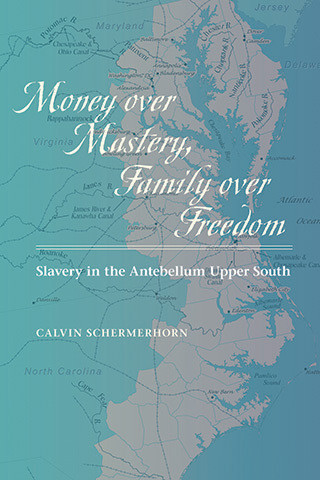Once a sleepy plantation society, the region from the Chesapeake Bay to coastal North Carolina modernized and diversified its economy in the years before the Civil War. Central to this industrializing process was slave labor. Money over Mastery, Family over Freedom tells the story of how slaves seized opportunities in these conditions to protect their family members from the auction block.
Calvin Schermerhorn argues that the African American family provided the key to economic growth in the antebellum Chesapeake. To maximize profits in the burgeoning regional industries, slaveholders needed to...
Once a sleepy plantation society, the region from the Chesapeake Bay to coastal North Carolina modernized and diversified its economy in the years before the Civil War. Central to this industrializing process was slave labor. Money over Mastery, Family over Freedom tells the story of how slaves seized opportunities in these conditions to protect their family members from the auction block.
Calvin Schermerhorn argues that the African American family provided the key to economic growth in the antebellum Chesapeake. To maximize profits in the burgeoning regional industries, slaveholders needed to employ or hire out a healthy supply of strong slaves, which tended to scatter family members. From each generation, they also selected the young, fit, and fertile for sale or removal to the cotton South. Conscious of this pattern, the enslaved were sometimes able to negotiate mutually beneficial labor terms—to save their families despite that new economy.
Moving focus away from the traditional master-slave relationship in a staple-crop setting, Schermerhorn demonstrates through extensive primary research that the slaves in the upper South were integral to the development of the region’s modern political economy, whose architects embraced invention and ingenuity even while deploying slaves to shoulder the burdens of its construction, production, and maintenance.
Money over Mastery, Family over Freedom proposes a new way of understanding the role of American slaves in the antebellum marketplace. Rather than work against it, as one might suppose, enslaved people engaged with the market somewhat as did free Americans. Slaves focused their energy and attention, however, not on making money, as slaveholders increasingly did, but on keeping their kin out of the human coffles of the slave trade.







